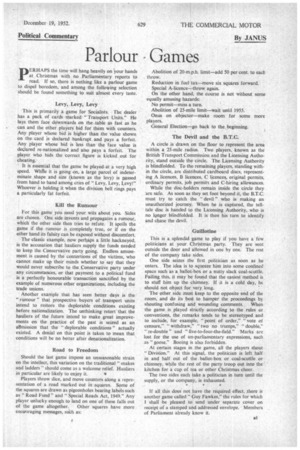Parlour Games
Page 35

If you've noticed an error in this article please click here to report it so we can fix it.
pERHAPS the time will hang heavily on 'your hands at Christmas with no Parliamentary reports to read. If so, there is nothing like a parlour game to dispel boredom, and among the following selection should be found something to suit almost every taste.
Levy, Levy, Levy • This is primarily a game for Socialists. The dealer has a pack of cards marked "Transport Units." He lays them face downwards on the .table as fast as he can and the other players bid for them with counters. Any player whose bid is higher than the value shown on the card is declared bankrupt and pays a forfeit. Any player whose bid is less than the face value is declared re-nationalized and also pays a forfeit. The player who bids the correct figure is kicked out for cheating.
It is essential that the game be played.at a very high speed. While it is going on, a large parcel of indeterminate shape and size (known as the levy) is passed from hand to hand among cries of Levy, Levy, Levy!" Whoever is holding it when the division bell rings pays a particularly fat forfeit.
Kill the Rumour For this game you need your wits about you. Sides are chosen. One side invents and propagates a rumour, which the other side then tries to refute. It spoils the game if the rumour is completely true, or if on the other hand its falsity can be exposed without discomfort.
The classic example, now perhaps a little hackneyed, is the accusation that hauliers supply the funds needed to keep the Conservative party going. Endless amusement is caused by the contortions of the victims, who cannot make up their minds whether to say that they would never subscribe to the Conservative party under any circumstances, or that payment to a political fund is a perfectly honourable transaction sanctified by the example of numerous other organizations, including the trade unions.
Another example that has seen better days is the " rumour " that prospective buyers of transport units intend to restore the deplorable conditions existing before nationalization. The unthinking retort that the hauliers of the future intend to make great improvements on the practice of the past is seized as an alimission that the "deplorable conditions" actually existed. A denial on this point is taken to mean that conditions will be no better after denationalization.
Road to Freedom Should the last game impose an unseasonable strain on the intellect, this variation on the traditional "snakes and ladders" should come as a welcome relief. Hauliers in particular are likely to enjoy it.
Players throw dice, and move counters along a representation of a road marked out in squares. Some of the squares are drawn as pigeonholes bearing labels such as "Road Fund" and "Special Roads Act, 1949." Any player unlucky enough to land on one of these falls out of the game altogether. Other squares have more encouraging messages, stich as:
Abolition of 20-m.p.h. limit—add 50 per cent. to each throw.
Reduction in fuel tax—move six squares forward.
Special A-licence—throw again.
On the other hand, the course is not without some equally amusing hazards: No permit—miss a turn.
Abolition of 25-mile limit—wait until 1955.
Onus on objector—make room for some more players.
General Election—go back to the beginning.
The Devil and the B.T.C.
A circle is drawn on the floor to represent the area within a 25-mile radius. Two players, known as the British Transport Commission and the Licensing Authority, stand outside the circle. The Licensing Authority is blindfolded. To the remaining players, standing within the circle, are distributed cardboard discs, representing A licences, B licences, C licences, original permits, ordinary permits, job permits and C-hiring allowances.
While the disc-holders remain inside the circle they are safe. As soon as they set foot beyond it, the B.T.C. must try to catch the " devil " who is making an unauthorized journey. When he is captured, the telltale disc is handed to the Licensing Authority, who is no longer blindfolded. It is then his turn to identify and chase the devil.
Guillotine
This is a splendid game to play if you have a few politicians at your Christmas party. They are sent outside the door and allowed in one by one. The rest of the company take sides.
One side seizes the first politician as soon as he enters. The idea is to squeeze him into some confined space such as a ballot-box or a nutty slack coal-scuttle. Failing this, it may be found that the easiest method is to stuff him up the chimney. If it is a cold day, he should not object for very long.
The other side must keep to the opposite end of the room, and do its best to hamper the proceedings by shouting confusing and wounding comments. When the game is played strictly according to the rules or conventions, the remarks tends to be stereotyped and to include, for example, "point of order," "vote of censure," "withdraw," "two no trumps," "double," " re-double " and "five-to-four-the-field." Marks are lost for the use of un-parliamentary expressions, such as "goose." Booing is also forbidden.
At certain stages in the game, all the players shout " Division." At this signal, the politician is left half in and half out of the ballot-box or coal-scuttle or chimney, while the rest of the party troop out into the kitchen for a cup of tea or other Christmas cheer.
The two sides each take a politician in turn until the supply, or the company, is exhausted.
If all this does not have the required effect, there is another game called "Guy Fawkes," the rules for which I shall be pleased to send under separate cover on receipt of a stamped and addressed envelope. Members of Parliament already know it.




















































































